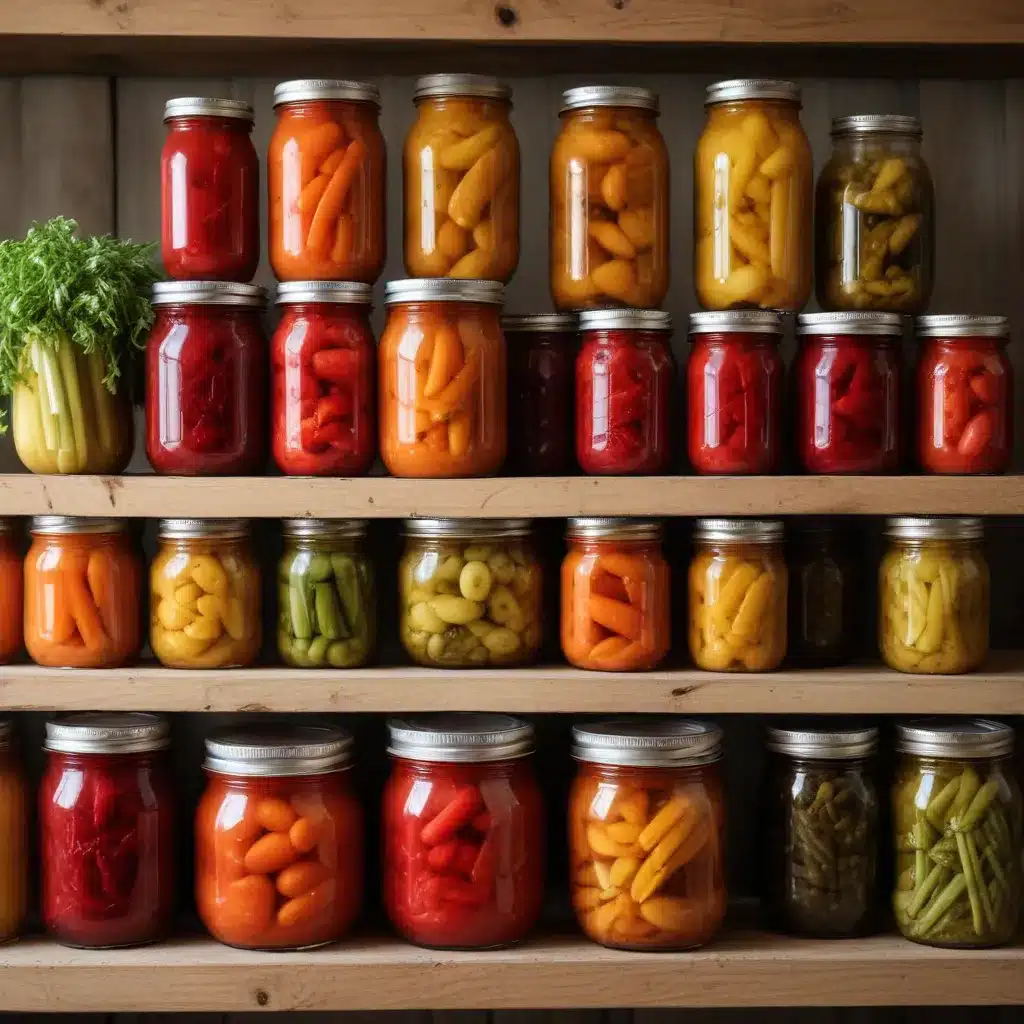
Farmhouse Flavors: Preserving the Harvest through Canning and Pickling
As the temperatures start to cool and the first hints of autumn arrive, it’s time to shift our focus to preserving the bountiful harvest from Crooked Pines Farm. While the summer heat may have been tough on the garden, the recent rains and milder weather have allowed our crops to thrive once more. Now is the perfect opportunity to capture the flavors of the season and stock our pantries for the months ahead.
Canning Techniques
One of the most time-honored methods of preserving the harvest is through canning. This process allows us to seal the freshness and nutrients of our homegrown produce into colorful jars that can be stored for up to a year. There are two main canning techniques to consider: water bath canning and pressure canning.
Water bath canning is the simpler of the two methods, suitable for high-acid foods like tomatoes, peaches, apples, and pickles. By submerging the sealed jars in boiling water, we can raise the internal temperature to 212°F, effectively killing off any molds, yeasts, bacteria, and enzymes that could cause spoilage. This method is ideal for creating homemade jams, jellies, and relishes.
For low-acid foods like green beans, carrots, beets, and corn, we’ll need to turn to pressure canning. This technique uses pressurized steam to reach the critical temperature of 240°F, necessary to eliminate the threat of botulism spores. While a bit more involved, a quality pressure canner is an invaluable tool for preserving the bounty of our vegetable gardens.
No matter which canning method you choose, it’s crucial to follow the recipe exactly. Any deviations in ingredients can impact the vital acidity levels and jeopardize the safety of your preserved foods. When in doubt, reach for modern, tested recipes rather than relying on old family favorites, as produce acidity has changed over the years.
Pickled Perfection
In addition to canning, pickling is another excellent way to extend the life of our harvests. Unlike canning, which uses heat to seal the jars, pickling relies on the preservative power of vinegar. There are two main pickling approaches: refrigerator pickles and canned pickles.
Refrigerator pickles are the easiest route, simply requiring a brine of vinegar, salt, and any desired spices. These quick pickles are ready to enjoy within a few days and can be stored in the fridge for several months. For those seeking a longer shelf life, canned pickles undergo a water bath processing step to seal the jars for pantry storage of up to a year.
When making pickles, it’s essential to use the specific type of vinegar called for in the recipe, as the acidity level is critical for safe preservation. White distilled vinegar with 5% acidity is the most common choice, though apple cider vinegar or even white wine vinegar can work as well, depending on the desired flavor profile. Similarly, be sure to use the salt variety recommended, as table salt can lead to cloudy brine and color changes.
Preserving Fruits
While vegetables might be the stars of our canning and pickling efforts, don’t overlook the bounty of fresh fruits available at the farm. Jams and jellies are perennial favorites, capturing the sweet essence of berries, stone fruits, and even citrus. For a healthier take, try your hand at fruit compotes – cooked down fruit mixtures that can be used in yogurt, oatmeal, or even as a topping for pork or poultry.
For a different type of fruit preservation, consider the magic of dehydration. Drying apples, pears, plums, and more concentrates their natural sugars, creating chewy, shelf-stable snacks perfect for lunchboxes or hiking trips. The key is to slice the fruit evenly and use a reliable food dehydrator or oven to slowly remove the moisture.
Pantry Essentials
No matter which preserving techniques you employ, there are a few key ingredients you’ll want to have on hand in your farmhouse pantry. Seasonings and spices like dill, garlic, peppercorns, and mustard seed can transform basic pickles and canned goods into flavorful creations. And be sure to stock up on various vinegar varieties – from apple cider to white wine – to provide the necessary acidity for safe pickling.
Don’t forget about the importance of proper pickling salt as well. Unlike regular table salt, this variety dissolves easily in cold brine and won’t cloud the liquid or discolor the vegetables. Kosher salt works in a pinch, but you’ll need to adjust the measurements, as the crystal size differs.
Healthy Harvest
As we fill our shelves with jars of vibrant jams, zesty pickles, and savory sauces, let’s not forget the incredible nutritional benefits of our homegrown produce. Many of the nutrient-rich vegetables we grow – like leafy greens, tomatoes, and bell peppers – only become more potent when preserved through canning or pickling.
And for those seeking gut-healthy options, consider experimenting with fermented foods. Lacto-fermented pickles, sauerkraut, and even fruit-based kvass provide beneficial probiotics that support overall wellness. These shelf-stable ferments can be enjoyed for months, offering a tasty way to nourish our bodies throughout the year.
No matter which preserving methods you choose, the true joy lies in stocking our pantry with the flavors of Crooked Pines Farm. From savory dill pickles to sweet apple pie filling, these homemade treasures will allow us to savor the bounty of the harvest long after the final frost. So let’s get canning, pickling, and drying – the flavors of farmhouse living await!


